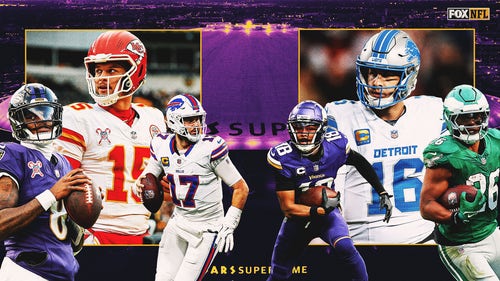
Cooper Rush has kept Cowboys afloat — with a new offense. Should they keep it?
By David Helman
FOX Sports Dallas Cowboys Writer
Don't discount what we learned from the Cowboys' coaching staff en route to this surprising 2-1 record.
Yes, the players execute the calls and ultimately decide the outcome. But in consecutive wins without Dak Prescott, it's impossible to ignore the role that coaching plays in evening the playing field.
Nowhere is that more noticeable than in the play of Cooper Rush, whose calm and cool presence has steadied the Cowboys' offense in these two wins.
Specifically in this most recent win against the New York Giants, Rush and offensive coordinator Kellen Moore were on a heater, as the Cowboys racked up nearly 400 yards and 23 first downs in Monday's 23-16 win.
"When you stay in those manageable situations and convert some third downs, take first and second down right back into first and second down — that's what you want to do on offense," Moore said on Tuesday.
Often criticized for his inconsistency as a playcaller over the past few years, Moore's game plan against the Giants was a clinic in how to help a quarterback with limited NFL snaps.
Notably limited at wide receiver with Michael Gallup still unavailable, Moore solved the issue by asking less of the position group. Not counting two snaps in the victory formation at game's end, the Cowboys ran 62 plays on Monday night. Roughly 44% of those came with extra tight ends on the field — despite starter Dalton Schultz being hurt — as the rookie duo of Jake Ferguson and Peyton Hendershot announced themselves as a pair of players worth being excited about.
That's not even because of their statlines, though they did combine for five catches and 56 yards. No, the impressive thing was how often Ferguson and Hendershot were asked to help protect Rush — and how admirable a job they did.
It stands to reason that extra tight ends would be used in the run game, but it's remarkable how often the Cowboys kept Ferguson and Hendershot in as blockers on passing attempts.
On Rush's 19-yard completion to Noah Brown midway through the first quarter, Ferguson handled an oncoming defensive lineman while Hendershot washed a blitzing safety out of the play. The extra blockers gave Rush added time to make a choice between the over route to Brown or a post shot to CeeDee Lamb.
The personnel wasn't necessarily relevant, though. Even in 11 personnel — one running back and one tight end, leaving three receivers outside — Moore did everything in his power to give Rush a clean look.
The Cowboys' most glaring error of the game tells the story. What will be remembered is Lamb dropping a possible touchdown on a 33-yard heave. The replay shows Rush faking a stretch handoff to Ezekiel Elliott, drawing the defensive front to its right, followed by Brown motioning across the formation to join Ferguson as sixth and seventh blockers.
With only two legitimate receiving options downfield after the play fake, it's honestly remarkable Lamb was able to find as much space as he did.
That's another important element — the play fake. Rush attempted 31 passes against the Giants, and 12 of those came with some sort of play action, whether it went to a running back or a player moving across the formation. Another eight attempts were rapid-fire reads. With the Giants bringing pressure to try and rattle an inexperienced quarterback, Moore dialed up a series of well-timed slants and receiver screens to get the ball out quickly. Even Lamb's jaw-dropping, one-handed touchdown was a quick throw, with Rush releasing an arcing fade pass after just two steps.
If I'm doing my math correctly, that means we're talking about Rush being protected by the playcall on 65% of his dropbacks. And to his credit, it's entirely possible he helped the Cowboys check into that situation himself, as Moore alluded to on Tuesday.
"Coop's been around this thing for a while; he can run the show just fine," he said.
How wide is the gap between Dak and Cooper Rush?
Regardless, it's beautiful to see a game plan come together that puts the quarterback in position to succeed. Running the ball for 176 yards at six yards a pop doesn't hurt either.
"I don't know our numbers, but I'm sure it was good," Rush joked after the game.
None of this is meant to disparage Rush, who is one of the coolest stories of this young season.
It's incredibly fitting that this week marks two years since Rush was released, by the New York Giants of all teams, dealing a possible death blow to his NFL career. Had Prescott not broken his ankle a few weeks later, Rush may never have received a call from his old employer to serve as depth behind Andy Dalton and Garrett Gilbert. Rush wound up back in Dallas, has started his first three NFL games at 28 and 29 years old and has done his job with aplomb.
Still, context is important. As we try to make sense of the Cowboys keeping their season afloat with a backup quarterback, at least some credit is due to those putting the plan in place.
If anything, the Cowboys would be wise to keep some of these things in mind when Prescott is available to execute the game plan once again.
David Helman covers the Dallas Cowboys for FOX Sports. He previously spent nine seasons covering the Cowboys for the team’s official website. In 2018, he won a regional Emmy for his role in producing "Dak Prescott: A Family Reunion" about the quarterback’s time at Mississippi State. Follow him on Twitter @davidhelman_.











